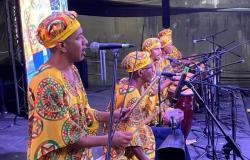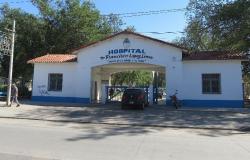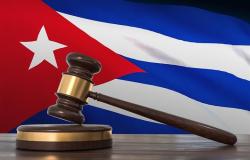In 2022, the professor and graduate in History Eduardo Sacheri published The Days of the Revolution, where he delved into the revolutionary stage of the Río de la Plata at the beginning of the 19th century and embarked on an editorial path with the firm intention that we better know and understand the historical process that led to the formation of Argentina throughout the 19th century.
Now he has just published his second book, “The Days of Violence. A history of Argentina. When it starts to be Argentina. 1820-1852”, by Alfaguara publishing house. In this work Sacheri focuses on the period between two battles: that of Cepeda in 1820 and that of Caseros in 1852. “On both occasions large political structures collapsed: the Directory and the League of Free Peoples in Cepeda and the Confederation Argentina led by Juan Manuel de Rosas’ Buenos Aires in Caseros. There are three decades of an Argentina “in formation”, because in the first half of the 19th century that country still did not fully exist. Neither in 1820, although some of its aspects are being outlined, nor in 1852, although its constituent elements are increasingly clear and visible,” he advances.
Why that title? “Because between 1820 and 1852 the violence of political confrontations reached levels unknown before, and very rare afterwards. Executions, the slaughter of prisoners, the execution of opponents, the display of corpses become regular and naturalized as part of the landscape of political struggle. As if the violence unleashed by the revolutionary cycle now descended a few steps into the darkest depths of human brutality,” he says.
After reading this, his latest book, the theatricality of the violence in those years in this incipient Argentina is striking. It is not that the author is revealing something that was not known; Even so, so much blood spilled throughout our history is surprising.
The serenity in Sacheri’s story is striking, for the better. “Emotions are invincible; They are always in us. And although they always inhabit us, I believe that for knowledge it is important that they do not govern us, the author reflects in his extensive dialogue with RÍO NEGRO Diary.
“Argentina is the product of a long, eventful and complex evolution. But it is true that some of the keys to that construction have their roots in those revolutionary times, in those people, in those circumstances and in those adventures. And those years at the beginning of the 19th century, when the Spanish Empire exploded into pieces, also live in us, in what we are in the 21st century,” he states. And he adds: “my approach to history is more attentive to broader processes and less attentive to the individual actions of men, even the most illustrious.”
“In this period that I analyze, there is a strong setback in terms of the brutal and bloodthirsty mechanisms that were preferred to resolve conflicts,” he admits. For this reason, it seems to him that “knowing more about the past allows us to better understand the present and organize ourselves in some way for the future. The past is always an interesting source to question our own beliefs.”
With one caveat, he insists: “it often seems inevitable to think about the people of the past from one’s perspective and from the present, attributing to them an imaginary organization and representations with other values, geographies, technologies… Doing this is a danger.” At this point, Sacheri says that he feels like the “ham in the sandwich” between the academic world that produces reliable knowledge and a society that does not have to have direct access to that knowledge.
How do we use the past? “Today we live in a time where there are many fanatics and they need certainties, they are more emotional than rational, they place themselves in the place of the good and the others are all the bad. This is of no use to bonding with others or understanding each other. The worse we understand reality, the worse we operate on it. Just as you can use a stone to kill, you can use history to hammer another.” In any case, “using history is inevitable. As inevitable, it is neither good nor bad. The issue is that the more we know about it, perhaps its use will be less harmful and more illuminating.”
With these books “I am not here to tell any story that they hid from you or prevented you from knowing,” he notes with some humor. “I don’t have that arrogant or arrogant attitude.” The truth of all this is that “one investigated here, there, we ask ourselves these questions and we reach a composition of place today. It is more than likely that tomorrow questions will arise that we do not see today.”
“Why that title? Because between 1820 and 1852 the violence of political confrontations reached levels unknown before, and very rare afterwards.”
Eduardo Sacheri
For this reason, “it is worth stopping to think about the historians of other times and current times. How his vision on that matter changed. Science evolves. Your questions evolve and your answers evolve. This happens in all sciences and History is no exception,” he states in his book. Of course, today one could wonder what the people who lived in these territories would feel in the decades after 1810. For example: how the Tucumán could add Argentineness to his identity, how the Córdoban could do it…
On this point, the caudillismo and the extraordinary powers of Juan Manuel de Rosas we spoke with him. “It took a long time for people from Corrientes, Santiago and Mendoza, among others, to add Argentinian identities to their provincial identities. It is interesting to know that process. Furthermore, when all this was not even consolidated, a new challenge began: immigration. How do they also add the identities of the Italians, Spaniards, Russians, Syrians…”, he comments.
The leaders in Argentine history
The decades that Sacheri analyzes are full of leaders. A legendary one, Facundo Quiroga; another very famous one, Juan Manuel de Rosas. Of course they are not the only ones. In this regard, the author says: the word “leader” is not only used in History. “It is a concept that, even in common language, refers to leadership, the exercise of power, command. It also usually has an emotional nuance. A leader bases his leadership not so much on the position he holds, but on his charisma, his emotional bond with those who follow him.
The River Plate leaders of the 19th century are leaders. “That is undoubtedly. Their leadership is usually political and military in nature. That leadership does not necessarily have institutional roots. That is to say: a leader can be governor, but his power and authority do not necessarily emanate from holding that or any other position. No. His power emanates from the personal bond he establishes with his followers. And those followers usually belong to the popular sectors, who support him in politics and accompany him in war. In these decades of the 19th century, the leaders are extraordinarily important.”
Between 1820 and 1852 the political situation was very unstable, where numerous armed conflicts took place. In them, these leaders are fundamental figures. Sacheri maintains that “the first historians who dealt with the leaders, later in the 19th century, had a very negative view of them.”
“Armed conflicts, although they did not disappear, became more exceptional. Looking back they saw chaos, destruction and disorder. And they understood that the leaders had art and a fundamental part in that disorder. They saw them as an obstacle to the national organization, and deplored their existence for that reason. Although this critical view softened a bit over the years, it was in the 20th century, especially after 1930, when the revisionists proposed a profound change in this regard. As these revisionists were very critical of Argentina, which began to consolidate since, say, 1860, and especially since 1880, they proposed an inverse view: the caudillos had been popular, heroic and valuable leaders. And they had done everything possible to avoid that Argentina that the revisionists saw with such critical eyes. In the 1960s, that revisionist view came to consider some leaders, such as Chacho Peñaloza or Felipe Varela, as almost representatives of a class struggle between an oppressed people and a landowning class that exploited them,” Sacheri wrote in his latest book. .
Extraordinary powers in Argentine history
“The rosista order rejects the liberal values that between 1810 and 1830 had been taking root in political culture. The division of powers, the retreat of ecclesiastical power, electoral competition, the right of minorities to express themselves and criticize the government are seen by Rosismo as dissolving elements. With the Restorer none of these new features are necessary. On the contrary: they are harmful.
Those who have defended the introduction of these innovations are enemies of order, enemies of peace. And they must be extirpated from society. They are not mere “opponents.” They are enemies of all that is good. They are the sum of evil. Rosas will bring together in the concept of “unitary” all the vices, all the defects, all the dangers,” Sacheri argues in his book.
And he adds: “If the leader knows perfectly well what is good for society, those who oppose the leader are, in reality, opposing society as a whole. And that is why they do not deserve to be part of the social body. They must be extirpated, with exile, prison or slaughter. Anyone who dares to oppose the Restorer is, without further ado, a Unitarian. And as a Unitarian, he is savage, unclean and impious. With this impiety, that slogan of “Religion or death” that Quiroga had raised a decade before returns, enhanced.
That is why it demands and is given extraordinary powers. It all sounds so current, we tell the author. And the author, once again, repeats to us that “history does not repeat itself, but human beings do. Our arsenal of possibilities is quite limited.”
How we get out of the labyrinth is permanent anguish, we tell him. “As soon as Rosas was defeated, the Constituent Convention declared that it is prohibited to grant extraordinary powers to presidents and governors,” answers the interviewee.
“This thing about history repeating itself gives something of fate. And no, it’s not. History is like life itself, it changes.”
Eduardo Sacheri.
“The temptation when faced with the distressing need to get out of the labyrinth is to feel that our leader is the only one who knows how to get out of it and since he is the only one who knows how to do it, he deserves that we bow our heads and blindly obey. This not only happens to Argentina,” says Sacheri.
The present again. “Let’s not leave History,” he demands. “This thing about history repeating itself gives something of fate. And no, it’s not. History is like life itself, it changes. We human beings tend to repeat ourselves in our failures, inabilities and temptations,” he adds.
And finally: “History is made by leaders and also by each of us, who are involved in a web of economy, identity, culture, gender, politics, demographics, imaginaries and expectations. That’s why if something goes wrong, it’s our responsibility too, some more than others.”
For this reason, in his book Sacheri tells his readers that they will not find a story full of epic that extols characters from the past or justifies political projects of the present.” Nor will they find “an invitation to group historical actors into good and bad, loyal and traitor, patriots and sellouts. It seems more useful to me to start from another principle: that each society, each time, deserves to be understood before being judged.”
Who is Eduardo Sacheri
Eduardo Sacheri was born in Buenos Aires in 1967. He is a professor and graduate in History. He taught at the university level for almost twenty years and currently continues to teach at the secondary level in the province of Buenos Aires. The author of stories and novels. Aráoz and the truth was adapted to the theater and The Question in His Eyes, Papers in the Wind and The Night of the Power Plant were made into films. His work has been translated into more than twenty languages. He is also a screenwriter and collaborates in national and international newspapers and magazines.





